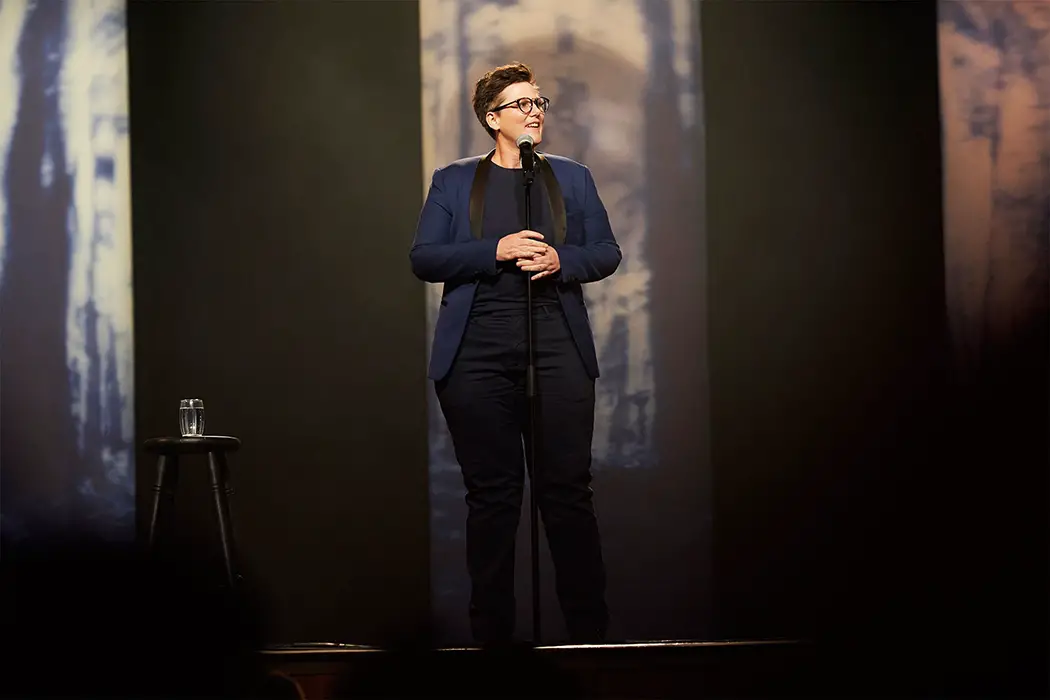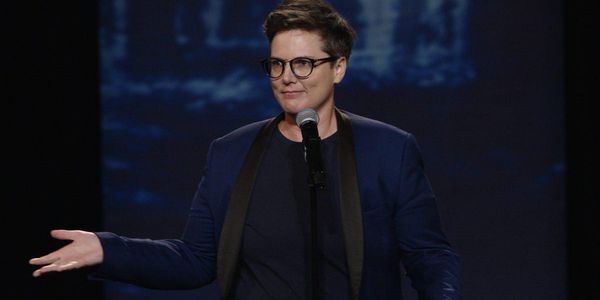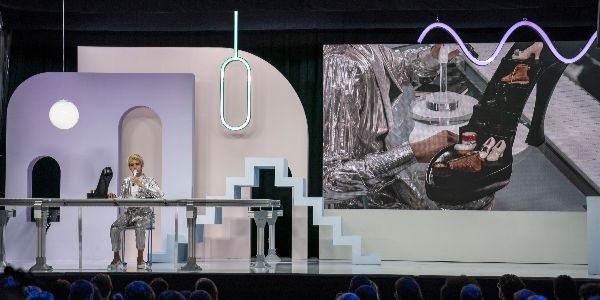Hannah Gadsby’s NANETTE Is Not A Film, Here’s Why

Alex is a film addict, TV aficionado, and book lover.…
Several months ago, on this very site, Jacqui Griffin brought our ongoing debate about the classification of Hannah Gadsby’s special Nanette into the public sphere. She made an articulate and studious argument in her article Hannah Gadsby’s NANETTE Is A Film, Here’s Why, and while some of you may have been swayed, I was not.
Perhaps a formal response is, as she put it, “obstinate pettiness”, but the endurance and breadth of our previously-private-now-public debate would indicate otherwise. Classifying and defining a piece of art is complicated, hamstrung as it is by vague definitions and the constant pushing of form by artists that care more about optimal expression than the fabricated boxes critics and scholars use to evaluate their creations. Jacqui and I love film and art and Nanette, so dissecting what film encompasses and whether Nanette can fall into that sphere has its own worth to us, as I imagine it will for many of you readers.
Which leads me to my stance that the form-breaking, incisive, brilliant Nanette is exactly what it says on the box: a stand-up comedy special, one that is in line with the experimentation other stand-ups are bringing to the wild west of filmed performances.
Blurred Lines
Now, I have to admit that there’s a lot of points Jacqui made that I agree with. I’m fine with the basic definition of film she uses, which is that it’s a story or event told with a filmic language and aesthetic (also, many thanks to her for doing the heavy lifting of defining film). She also admits that definition is “mutable” and that Nanette “doesn’t neatly fit into a category”.
On a basic level, we’re approaching this debate with a very similar mindset. I would say you’re never going to come up with an all-encompassing definition of film, at least not one that wouldn’t also leave the door open to lots of television and filmed performances, and the pieces of art that fall in the margins of this hazy definition can be argued for.

For these marginal pieces, precedent is a helpful thing to look at. Where, in general, do pieces get categorized? Does other work that equals or pushes boundaries even further break through into the gloried halls of film?
I’m no comedy special expert, but I’m aware that it’s having a golden age with streaming services producing them in droves. Therefore, we’re getting a lot of experimentation, and other recent specials have been pushing boundaries in similar ways to Nanette.
Let’s first look at the narrative aspect of Gadsby’s special. While not exactly telling a single story or event (the opening bit explaining the special’s name doesn’t really go anywhere), it’s themes about being a queer woman in comedy is foregrounded, and it twists and builds on many of the bits from the show’s first half to make very uncomfortable observations about art in general and stand-up comedy in particular. The same could be said of Cameron Esposito’s Rape Jokes, a comedy special about the experience of being a queer woman and a sexual assault survivor that breaks down how jokes about rape are often misused. It’s remarkably similar to Nanette in content, and while its approach is not nearly as clean, it does circle back on stories and do the narrative basics that Gadsby mastered in Nanette.
Then there’s the filmic language and aesthetic of film, which is where Nanette gets absolutely blown out of the water. It does smartly edit between Gadsby and the audience, but so does Rape Jokes, both of which benefit from this emphasized breakdown between the performer and the audience. Other comedy specials, though, have incorporated film language and aesthetics much more broadly.
It’s crucial, for example, in Julio Torres’ My Favorite Shapes (at this point I would assure you that not all of my examples are going to be from queer artists, but surprise, they’re pretty much all from queer artists). The special is exactly what it sounds like; it’s Torres showing the audience his favorite shapes. There’s a shiny conveyor belt that brings each object out that is part of the special’s elaborate, silvery, futuristic set and costume design. Torres, for the most part, sits in the center of the stage and displays his often small objects to a camera that projects onto a large screen next to him. This allows the live audience to see small details and gestures, meaning the special, in essence, would not work without a camera. But this integral integration isn’t the only way he’s playing with medium. There’s also edits that are the punchline of jokes and fantastical, prerecorded sections that play on the screen for the live audience and is entirely cut away to for the HBO version. In these ways, My Favorite Shapes fully incorporates comedic film language, and yet it’s still accepted as a comedy special.

So no, Gadsby is not pushing the format of the stand-up comedy special any further toward film than her peers, so why is there this impulse from so many people to redefine Nanette? From what I can tell, it’s just our perception of “high” (aka quality) versus “low” (aka frivolous) art. Comedy is widely considered “low” art while film is designated as “high” art. In case the quotations aren’t tipping you off, let me state it clearly: I think this differentiation is ridiculous. All mediums and genres have produced great art, and Nanette’s quality isn’t lessened by classifying it as a stand-up comedy special. The labor of arguing that Nanette is a film, and the argument for many pieces that fall in the hazy margins, can be avoided if we just accept that mediums are not distinguished by quality (which is a long, protracted argument worthy of its own series of articles).
But Why A Stand-Up Comedy Special?
Fair question, me. First off, it’s presented as a comedy special by Gadsby, but yeah, the author is dead and that argument is reductive and not much fun. The more nuanced take, and the reason why I think it’s incredibly important that Nanette remains a comedy special, is that it primarily subverts and plays with the standards of stand-up comedy in the same way that many films of questionable categorization work against film standards.
No one is out here arguing that, say, the works of Barbara Hammer don’t classify as film. A “filmmaker of lesbian sexuality” per her New York Times obituary, her numerous shorts and features rarely followed the established narrative or aesthetic qualities of film. In fact, they worked in direct opposition to them, creating sensual experiences that centered the feelings of lesbians and other queer people in ways that defied their previous erasure. As I like to joke about Nitrate Kisses, one of her more well-known documentaries that is mostly four long sex scenes, is it porn if you scroll the Hays Code over it? No, it’s not, because if you’ve filmed it in a way that focuses on what mainstream movies have traditionally looked away from and made it very clear that you’re consciously working against these standards by scrolling the literal rules over it, then your questionably defined piece of art firmly crosses the line into (non-pornographic) film. It may be creating a new kind of film language, but it’s still built on what came before it and loses meaning if divorced from that history.
The same can be said of Nanette and its relationship to stand-up. So much of it is a deconstruction of stand-up convention, with Gadsby setting us up for the normal routine, explaining exactly what we expect and why we expect it, then defying the rules she established while still making us laugh. That’s the thing that often gets overlooked when breaking down the brilliance of Nanette; it’s incredibly funny. Yes, it gets slightly less so at the end, but even in the waning moments she’s controlling the tension, as she might say, through jokes. Her rage crescendos and is dispersed through jabs at “angry white men comedy” and “the men in the room”, all feeding into her overarching conversation about whether stand-up is the proper medium to tell her story. The traditional stand-up is a straight man. Gadsby is neither of those things, and like queer people in film, that means she had limited established ways of expressing herself in her medium. So she broke the standards while still clearly building on the rules that previously held her down, perhaps creating a new language, but still a hilarious stand-up language, not a filmic one.
To divorce Nanette from the history it works against would be as debilitating to its impact as to divorce Nitrate Kisses from the Hays Code. So sure, you can argue Nanette is something other than a stand-up comedy special, but should you?
Does content like this matter to you?
Become a Member and support film journalism. Unlock access to all of Film Inquiry`s great articles. Join a community of like-minded readers who are passionate about cinema - get access to our private members Network, give back to independent filmmakers, and more.
Alex is a film addict, TV aficionado, and book lover. He's perfecting his cat dad energy.













